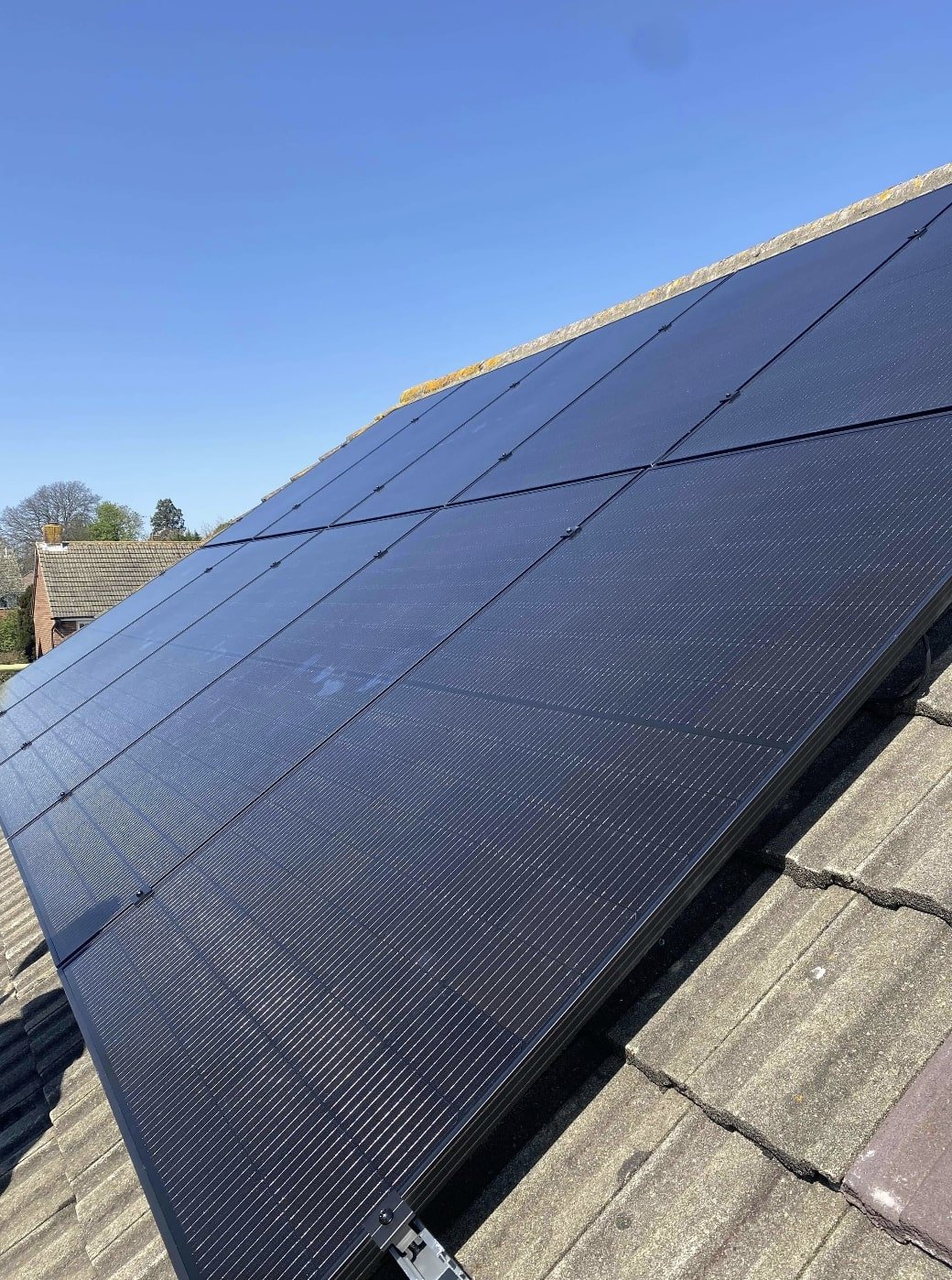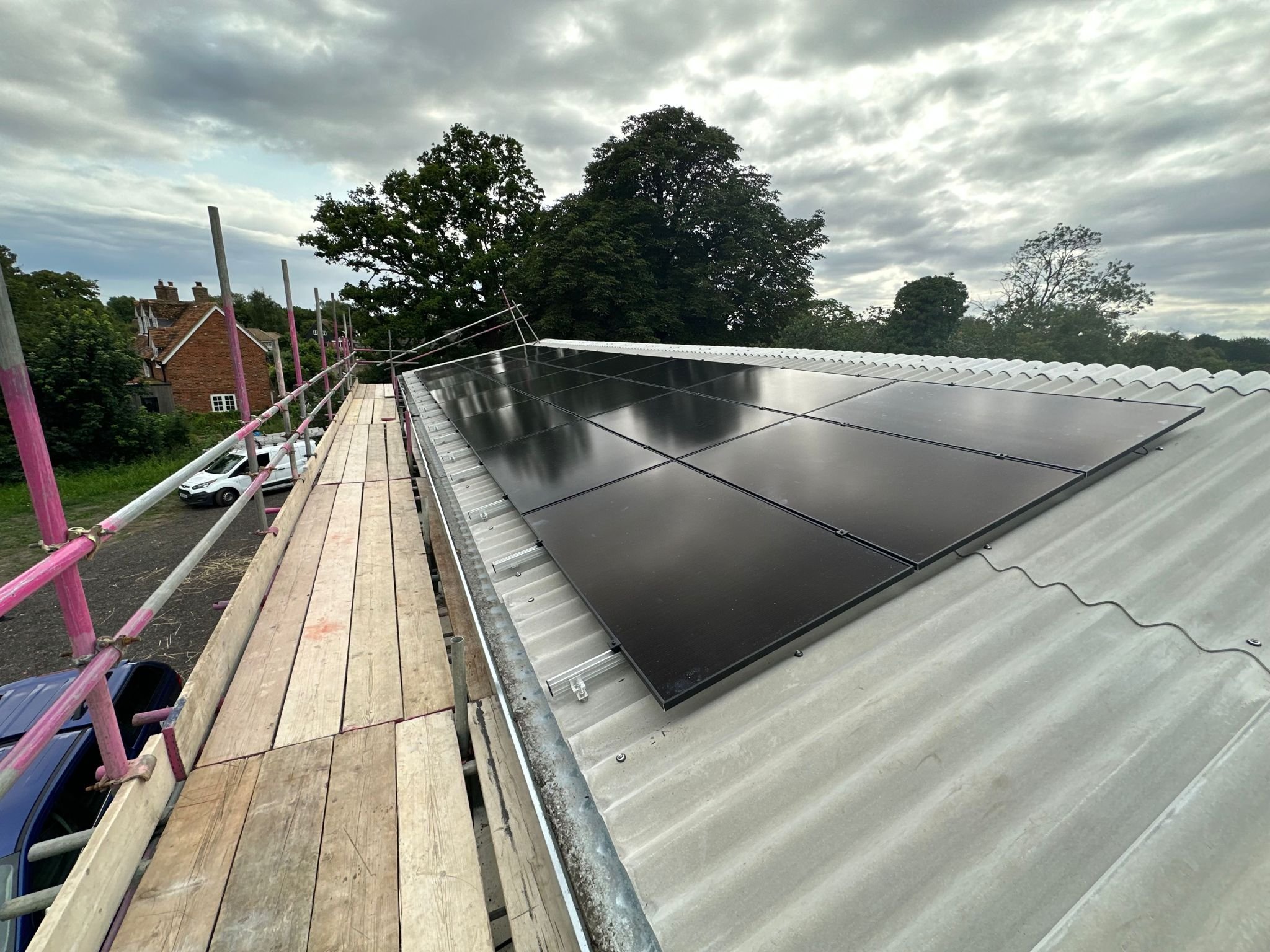
Will Solar Panels Work During Cloudy or Rainy Days?
What’s on this page?
In this article, we’ll talk through how well solar panels perform in cloudy or rainy weather in the UK.
How good are solar panels really in the UK?
Do solar panels work on cloudy days?
What about rainy days?
The role of angle and orientation
and more
Solar energy is becoming a powerful and sustainable alternative to fossil fuels, and we’re moving towards a greener future.
As more people in the UK, especially in the sunny South of England, consider getting solar panels, a common question arises: do solar panels work on cloudy or rainy days?
In this article we’ll explain the facts of solar panel performance in the UK’s climate, in the South, and how these systems still work when the sun takes a break.
UK Solar Potential: How good are solar panels in the UK?
The UK may not have the same amount of sunshine as tropical places, but its solar potential is often underestimated.
Solar panels use sunlight to generate electricity, but can pick up low levels of sunlight, making them a viable option even in the UK’s often overcast or cloudy conditions, although the solar panel’s efficiency will be reduced. In fact, solar panels can still work on cloudy or rainy days, just not as much as on clear sunny days.
How Solar Panels Work
Solar panels convert sunlight into electricity through a process called photovoltaics (PV). These panels are made up of many small photovoltaic cells made from semiconducting materials like silicon. When sunlight hits a photovoltaic cell, it excites the electrons in the material, causing them to flow and create an electrical current. This current is then collected and sent through an inverter, which converts the DC power into AC power for use in homes and businesses.
The efficiency of a solar panel depends on how much sunlight it gets. Direct sunlight is the best for generating electricity, but solar panels can still work on cloudy days, just not as much. The efficiency of a solar panel is measured by how much sunlight it turns into electricity. Of the different types of solar panels, monocrystalline solar panels are the most efficient, some models can get up to 24% efficiency. They’re perfect for maximising energy production even on less than ideal weather conditions.
Do solar panels work on cloudy days?
Cloud cover reduces the amount of sunlight solar panels get, so energy production will be less than on a clear day.But modern solar panel technology can capture diffused sunlight, which is still present on cloudy days.
Note that energy production will be lower, but solar panels will still produce electricity on cloudy days.
Solar panels still convert light into electricity, just at a reduced rate.
What about rainy days?
Rain can actually help in some cases.
Rain washes away the dust and dirt that may accumulated on the panels over time.
Clean solar panels are more efficient at capturing sunlight, so a good rainfall can give a temporary boost in energy production after a period of dry weather.
This cleaning effect is especially beneficial in areas like the South of England where there are frequent rain showers.
Solar Panel Options for Cloudy Areas
If you live in a cloudy area, you might wonder if solar panels are an option. The good news is that solar panels can still generate electricity on cloudy days, just less. To optimise electricity production in such areas, high efficiency solar panels like monocrystalline panels are recommended. These panels are designed to capture as much sunlight as possible even when the sky is overcast.
Another option for cloudy areas is to use solar panels with higher power output. This will ensure that even on cloudy days, the panels can still generate a significant amount of electricity. And having a solar battery storage system can be very beneficial. These systems store excess energy generated during sunny periods which can then be used during cloudy days or at night to ensure a constant power supply.
Angle and Orientation
The angle and orientation of solar panels play a big role in their performance, especially in areas with less consistent sunlight. In the UK, solar panels are installed at an angle that maximizes their exposure to the sun throughout the year. South facing panels get the most sunlight, so even when the sun is not at its peak, energy production is optimised. This strategic installation approach helps to mitigate the impact of cloudy or rainy days on solar panel performance.
Energy Savings
While solar panels do produce less energy during cloudy or rainy days, it’s important to look at the bigger picture of solar power. Over the course of a year, the cumulative energy generated by solar panels in the UK, including the South of England, can still lead to significant energy savings. Advances in solar technology and more efficient panels mean better performance even in less than ideal weather conditions.
Benefits of Solar Panels in Cloudy Areas
Even though solar panels may not produce as much electricity on cloudy days, they still have many benefits for homeowners and businesses in such areas. Firstly, solar panels can reduce your energy bills by generating free electricity during sunny days. They also increase the value of your property and give you a sense of energy independence.
Plus, solar panels are a clean and renewable energy source, produce no emissions or pollution. They’re a great option for those looking to reduce their carbon footprint. And solar panels require minimal maintenance and can last up to 30 years or more, so it’s a long term investment in your energy future.
Monitoring and Managing Solar Performance
To address concerns about solar panel efficiency during cloudy or rainy days, many systems have monitoring tools. These tools allow homeowners and businesses to track their solar panel’s energy production in real time. By keeping an eye on energy output, users can identify patterns and make informed decisions about their energy consumption.
In the winter, when daylight hours are shorter and the sun is weaker, solar panels still contribute to energy savings. Yes, solar panel output will be slightly lower during this season but the savings add up over time. Modern solar systems are designed to handle varying weather conditions, including winter sunlight. The energy generated during the sunnier months is often stored and can be used to offset higher energy demands during the colder season. Some areas, especially in the South of England, still get a lot of sunlight during winter. So even on cloudy or rainy winter days, solar panels can still generate electricity, reducing reliance on grid power and providing ongoing financial benefits to homeowners and businesses. By looking at the annual energy production and savings potential, it’s clear that investing in solar panels in the South of England gives you summertime benefits and wintertime cost savings.
How do panels work in winter or cloudy weather?
Panels are designed to work efficiently and effectively in wintertime conditions, to produce consistent energy even when daylight hours are shorter and weather is less than ideal. Here’s how they work in the wintertime:
Sunlight Conversion: The panels are made up of solar cells, usually made of silicon. These cells can convert sunlight into electricity through the photovoltaic effect. Even on cloudy or overcast days, these cells can capture diffuse sunlight and convert it into usable energy.
Low Light Performance: Systems are engineered to have low light performance. This means they can still generate electricity even when the sunlight is not as intense, like in winter. The panels are designed to capture a broad spectrum of light, including ultraviolet (UV) and infrared (IR) rays, which are present even on cloudy days.
Angle and Orientation: Installation plays a big role in their wintertime performance. Panels are typically mounted at an optimal angle and orientation to get maximum sunlight exposure throughout the year, including winter solstice. This means the panels get as much sunlight as possible, even when the sun is lower in the sky.
Snow and Cleaning Effect: Snow accumulation on solar panels is a common worry during winter. But panels are designed with durable materials and surfaces that can help shed snow more easily. Plus the angle of the panels and the warmth generated by the sun can help melt snow and prevent long term accumulation. A snowfall followed by sunny weather can even give a temporary boost in energy production due to the cleaning effect as the snow slides off the panels.
Temperature Performance: Cold temperatures can actually benefit solar panel performance to some extent. Solar panels perform better at lower temperatures. Extreme heat can slightly reduce efficiency, while cold temperatures help maintain stable voltage and overall system performance.
Energy Storage: Many solar installations are connected to energy storage systems, like solar batteries. This allows excess energy generated during sunnier periods to be stored and used during times of lower sunlight, like winter days and nights. Energy storage systems ensure a consistent power supply and maximise the benefits of solar energy throughout the year.In summary, modern systems are designed to work reliably and efficiently in wintertime conditions in the South of England and beyond. They can capture diffuse sunlight, have optimal installation angles, are durable in snow and compatible with energy storage systems so they are perfect for those who want consistent energy generation and savings even during winter.
How to Get Power at Night with Solar Panels
A common myth about solar panels is that they don’t work at night. While it’s true that solar panels don’t generate electricity after sunset, there are still ways to use their power at night. One solution is to use a solar battery storage system. These systems store excess energy generated during the day which can then be used at night to have a continuous power supply.
Another option is to use a net metering system. This allows you to sell excess energy generated during the day back to the grid and get credits on your energy bill. So even if you’re not using energy at night, you can still benefit from the energy your solar panels produced during the day.
And adopting energy efficient appliances and smart home devices can help reduce your energy consumption at night. By optimising your energy use you can make the most of the electricity generated by your solar panels and reduce your reliance on the grid.

Get a free installation estimate
One of our expert team members will contact you to give you an estimate and answer any questions you may have.
Join the solar revolution and save up to 80% on your energy bill.
✓ No obligation
✓ MCS accredited
✓ Your questions answered
Read our great reviews on Trustpilot
Dave Wood
“We had a great experience with CRG…”
“We had a great experience with CRG installing our solar panels and battery. Pre-install I had quite a few questions and they were always answered quickly and in an easy to understand way. During the installation the team discovered that it wasn’t going to be as straightforward as they initially thought due to the strange layout of our house and the location of the electrical fuse box etc but they did a great job of working out a route for the cabling that caused the least disruption. Since the install I’ve had another couple of questions about configuring the system and again, I got a quick and helpful response.”
Joyce Scott
“A pleasure to deal with.”
“From the initial survey till completion of the installation I have been most impressed. There was no hard sell, everything was explained clearly. Once I had accepted the lead date was just a matter of weeks. The actual installation was completed very efficiently. The backup support is second to none. l can't recommend Frank, Melissa and the team more highly for the whole experience.”
Paul Wickenden
“Very impressed”
“Frank came out to measure and quote for solar panels. He was professionally and quick with his quote. We did not feel rushed or pressured into purchasing at all.
Timescales were accurate and their communication was speedy and sincere.
Installation was brilliant. You could tell the installers knew exactly what they were doing.
Warning- The app to see your solar usage and generation is addictive!”





